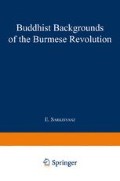Abstract
England’s liberal justification for its domination, tutelage and accompanying advantages in such ‘native’ countries has been its claim of acting as “a trustee for civilization in order to ... build up those conditions of liberty and opportunity for the individual in which the people can learn to govern themselves.”1 Since Edwardian times such claims that the peoples of Indic civilization had yet to be trained for fitness to govern themselves came to meet militant contradiction — first in terms of West European borrowings of liberal programs of self-determination, and then in terms of reinterpretations of pre-European Indic traditions in the direction of self-determination aspirations. Precisely British imperial claims of ruling subject peoples like the Burmese “in order to educate them in the responsibilities of self-government” produced counter-claims about Democracy being part of Buddhist tradition. Interpretations of India’s Buddhist heritage as democratic tradition permitted to refute British claims about the White Man’s Burden and White Man’s Mission to impose tutelage on native peoples until they should have advanced far enough in their “education” to “learn the responsibilities” of governing themselves.2
Access this chapter
Tax calculation will be finalised at checkout
Purchases are for personal use only
Preview
Unable to display preview. Download preview PDF.
References
Burma, Imperial Idea Committee, Report of the Committee appointed to ascertain and advise how the Imperial Idea may be inculcated and fostered in...Burma (Rangoon, 1917), p. 53.
Burma Reforms Committee, Record of Evidence, Vol. II (Rangoon, 1922), p. 80. 3 Cf. Sarkisyanz, Russland und der Messianismus des Orients, pp. 316–326.
MBUBW, XV, No. 8 (August, 1907), p. no.
R. Paw U, “The Buddhist Priesthood in Burmese Society” (unpublished Master of Arts Dissertation: Columbia University, New York, 1948), p. 59.
R. C. Majumdar, Corporate life in Ancient India (Calcutta, 1922), pp. 226f.
Manavendra Nath Roy, From savagery to civilization (Calcutta, 1940), p. 15;
Bhikkhu J. Kashyap (Pali Institute Nalanda), in: K. W. Morgan (Editor), The Path of the Buddha. Buddhism as interpreted by Buddhists (New York, 1955), p. 35.
Gokuldas, Democracy in the early Buddhist Saṃgha (Calcutta, 1955), p. xv.
Ibid., p. 83.
Ibid., p. 115.
K. P. Jayaswal, Hindu Polity. A constitutional history of India in Hindu Times (Bangalore, 1943), p. 173.
Ibid., p. 44.
Mahâvastu, I, 135–136: transl. Jones, Vol. I, pp. 107f.
Gokuldas, op. cit., p. 108.
Nihar-Ranjan Ray, An Introduction to the study of Theravâda Buddhism in Burma (Calcutta, 1946), p. 265.
A. E. Fletcher in: “The New Age,” reprinted in: JMBS, VII (January, 1890), No. 9, p. 86. In this sense Crosthwaite complained — from the standpoint of Burma’s British conquerors — that “in a country where one man is as good as another, where there are no landlords, no hereditary aristocracy and no tribal chiefs, the government, especially a foreign government, is at a great disadvantage”: Crosthwaite, The Pacification of Burma, p. 22.
P. Lakshmi Narasu, The Essence of Buddhism (Madras, 1907), pp. 45–46.
Alexandra David-Neel, Le modernisme bouddhiste et le bouddhisme du Bouddha (Paris, 1911), pp. 244f.
Lakshmi Narasu, The Essence of Buddhism, p. 46.
Majumdar, Corporate life in Ancient India, p. 319.
Nakamura, The Ways of thinking of Eastern Peoples, p. 154.
G. Hafner, Kernprobleme der buddhistischen Ethik (Erlangen, 1927), p. 57.
Saṃyutta Nikâya, I, 3, vii, 8: Pâli Text Society, Translation Series, No. 7 [= The Book of the Kindred Sayings, transl. Mrs. Rhys Davids, Part I,] (London, 1950), p. 23.
MBUBW, XXVII, No. 10/12 (October/December, 1919), p. 127.
“Buddhism and Christian Missions,” in: MBUBW, XXIX, No. 10 (October, 1920), pp. 213f.
Ibid., p. 212.
Ibid., pp. 214f.
Maha-Bodhi, XLI (1933), p. 348.
Zeyawadi U Thilasara’s article in: Pinnya Alin of Waning-Wagaung 1285 Burmese Era (September 1, 1923).
Sayadaw Zeyawadi U Thilasara, in: Pinnya Alin of Waning-Wagaung, 1285 B.E. (September 1, 1923), translated by U Wan Nyunt, who also translated the passage from this newspaper printed in F. van der Mehden, “Changing Pattern of Religion and Politics in Burma,” in: R. Sakai (Editor), Studies on Asia, 1961 (Lincoln, Nebraska, 1961), p. 72, Reference 6.
Cf. Edward J. Thomas, History of Buddhist Thought (London, 1953), p. 122, fn.
Sayadaw U Thilasara, op. cit.
Ibid.
From the ordinary state of Man to Dwi-he-tu, then to Ti-he-ta and finally into the Sotapana and Thagadagami Pathways. Ibid.
Thakin Kudaw Hmain: Thakin-Tîkâ; (Rangoon, 1938), p. 181.
Thayawadi U: Nye Ya Sayadaw-thi, Wunthanu Dhamma neyu Padeytha Cam (Rangoon, 1319/1957 reprint), Vol. 1, p. 10.
Bal Gangadhar Tilak, Srimad Bhagavadgitâ Rahasya or Karma-Yoga Sastra (Poona, 1935), Vol. I, pp. 457, 513;
V. P. Varma, Modem Indian political thought (Agra, 1961), pp. 305f.
Cf. Bama-hkit U: Ba Yin, Sayadaw U: Ottama (Lu’ la’ yei: sei’ da’myou: sei. hca. hike, thu) (Amsterdam, no date), pp. 25f., 31.
Cf. Cady, A history of modem Burma, p. 232.
Author information
Authors and Affiliations
Rights and permissions
Copyright information
© 1965 Springer Science+Business Media Dordrecht
About this chapter
Cite this chapter
Sarkisyanz, E. (1965). The White Man’s Burden of Educating Natives for Self-Government and the Counter-Claim about the Democratic and Socialistic Heritage of Buddhism. In: Buddhist Backgrounds of the Burmese Revolution. Springer, Dordrecht. https://doi.org/10.1007/978-94-017-6283-0_18
Download citation
DOI: https://doi.org/10.1007/978-94-017-6283-0_18
Publisher Name: Springer, Dordrecht
Print ISBN: 978-94-017-5830-7
Online ISBN: 978-94-017-6283-0
eBook Packages: Springer Book Archive

